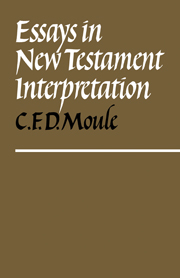Book contents
- Frontmatter
- Contents
- Foreword
- Acknowledgements
- Abbreviations
- Jesus in early Christian interpretation
- Studies in the Gospels
- Two studies in the Epistles
- Two linguistic studies
- Studies exegetical, doctrinal and ethical
- 12 The influence of circumstances on the use of christological terms
- 13 The influence of circumstances on the use of eschatological terms
- 14 St Paul and ‘dualism’: the Pauline conception of resurrection
- 15 A reconsideration of the context of maranatha
- 16 II Cor. iii.18b, καθάπερ ἀπὸ κυρίου πνεύματος
- 17 Punishment and retribution: an attempt to delimit their scope in New Testament thought
- 18 The theology of forgiveness
- 19 Obligation in the ethic of Paul
- 20 ‘…As we forgive…’: a note on the distinction between deserts and capacity in the understanding of forgiveness
- 21 The sacrifice of the People of God
- Index
15 - A reconsideration of the context of maranatha
Published online by Cambridge University Press: 05 November 2011
- Frontmatter
- Contents
- Foreword
- Acknowledgements
- Abbreviations
- Jesus in early Christian interpretation
- Studies in the Gospels
- Two studies in the Epistles
- Two linguistic studies
- Studies exegetical, doctrinal and ethical
- 12 The influence of circumstances on the use of christological terms
- 13 The influence of circumstances on the use of eschatological terms
- 14 St Paul and ‘dualism’: the Pauline conception of resurrection
- 15 A reconsideration of the context of maranatha
- 16 II Cor. iii.18b, καθάπερ ἀπὸ κυρίου πνεύματος
- 17 Punishment and retribution: an attempt to delimit their scope in New Testament thought
- 18 The theology of forgiveness
- 19 Obligation in the ethic of Paul
- 20 ‘…As we forgive…’: a note on the distinction between deserts and capacity in the understanding of forgiveness
- 21 The sacrifice of the People of God
- Index
Summary
It is widely held that the marantha of I Cor. xvi. 22 (construed as an imperative, ‘O our Lord come!’) is to be understood as an invocation of Christ to be present in the eucharist. Support for this is sought in the fact that other words and phrases in the same context can also be interpreted eucharistically: the kiss (ν. 20), the ‘anathema’ upon anyone who does not love the Lord (ν. 22), and the grace (ν. 23) can all be supposed to be among the preliminaries to the eucharist (in terms both of inclusion and of exclusion). Further, the maranatha also occurs in Didache x. 6, in a section connected at least in some way with the eucharist; and the Greek equivalent, ἔρχού κύριε ʾΙησοῦ, occurs in Rev. xxii. 20, together with amen (cf. Didache x. 6 again) and not far from what might seem to be a eucharistic ‘invitation’ (ν. 17).
But how much of this is really cogent? If I Corinthians was really intended to be (as it were) the homily, leading on into the eucharist, why is there so little trace of this in other New Testament epistles? Why does the maranatha in I Cor. xvi. 22 come at this particular point, before the grace (and the apostle's love)? Why does it occur where it does in the Didache? In spite of all that is said, is there sufficient evidence to suggest that it was meant to lead straight into the eucharist proper?
- Type
- Chapter
- Information
- Essays in New Testament Interpretation , pp. 222 - 226Publisher: Cambridge University PressPrint publication year: 1982



